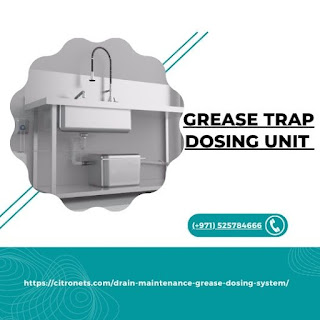Benefits of using a Grease Trap Dosing Unit and Grease Management System
In busy commercial kitchens, the efficient management of grease is crucial to maintaining proper sanitation, preventing clogs, and complying with regulations. Grease traps have long been used to trap and separate grease from wastewater, but traditional grease traps alone may not provide the most effective solution. That's where a grease trap dosing unit and a grease management system come into play. With advanced technology and innovative design, these systems offer several benefits that can greatly improve the efficiency and effectiveness of grease management in commercial kitchens.
What is a Grease Trap Dosing Unit and Grease Management System?
A grease trap dosing unit is a device that introduces biological agents into the grease trap to enhance the breakdown of fats, oils, and grease (FOG) present in the wastewater. This process accelerates the decomposition of FOG and reduces the buildup in the trap. A grease management system, on the other hand, is a comprehensive solution that combines a grease trap dosing unit with automated monitoring and maintenance features. It allows for real-time data collection, performance analysis, and remote control of the grease trap, ensuring optimal functionality and preventing issues before they occur.
Improved Grease Trap Efficiency
By introducing biological agents, a grease trap dosing unit enhances the natural process of grease decomposition. These agents contain enzymes, bacteria, and other microorganisms that break down FOG into simpler compounds. As a result, the grease trap can operate at a higher capacity and for a longer duration before requiring maintenance or emptying. The improved efficiency not only reduces the frequency and cost of maintenance but also minimizes the risk of clogs and backups.
Enhanced Odor Control
One of the common issues associated with grease traps is the unpleasant odor caused by the buildup of decomposing FOG. A grease trap dosing unit and a grease management system actively tackle this problem. The biological agents in the dosing unit help eliminate the odor-causing compounds in the grease trap, leaving behind a fresh and clean environment. This not only improves the working conditions for kitchen staff but also enhances the overall dining experience for customers.
Compliance with Regulations
Proper grease management is not only important for operational efficiency but also necessary to comply with environmental regulations. Municipalities and local authorities enforce strict guidelines regarding grease trap maintenance and discharge. By implementing a grease trap dosing unit and a grease management system, commercial kitchens can ensure that their grease traps function optimally, providing a consistent level of grease removal and maintaining compliance with regulations.
Cost Savings
The use of a grease trap dosing unit and a grease management system can lead to significant cost savings for commercial kitchens. By preventing clogs and backups, these systems eliminate the need for costly emergency plumbing services. Additionally, the improved operational efficiency of the grease trap reduces the frequency of required maintenance and extends the lifespan of the equipment. Over time, these cost-saving benefits add up, making the investment in a grease trap dosing unit and a grease management system highly advantageous.
Real-time Monitoring and Analytics
A grease management system goes beyond simply introducing biological agents into the grease trap. It provides real-time data collection and analysis, allowing kitchen staff or facility managers to monitor the performance of the grease trap remotely. This data-driven approach helps identify patterns, detect potential issues, and optimize the operation of the system. By leveraging this valuable information, kitchen owners can make informed decisions regarding maintenance schedules, grease trap emptying, and system adjustments, ensuring the best possible performance.
Conclusion
In conclusion, the use of a grease trap dosing unit and a grease management system brings multiple benefits to commercial kitchens. From improved grease trap efficiency and enhanced odor control to compliance with regulations and significant cost savings, these systems offer a comprehensive solution for effective grease management. By embracing advanced technology and optimizing grease trap functionality, commercial kitchens can ensure a clean and efficient environment while minimizing operational costs and meeting regulatory requirements.




Comments
Post a Comment